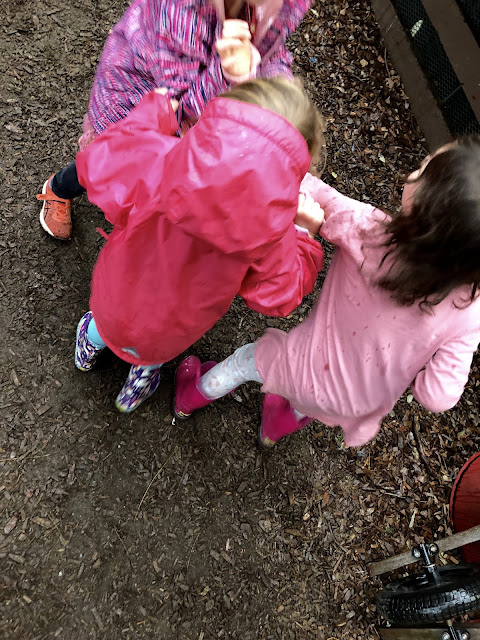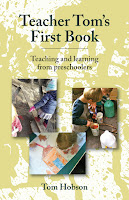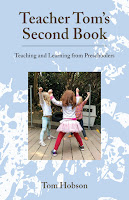It was cold out, but Maya didn't want to put on her coat. An adult tried to compel her, bringing her the puffy pink parka she had worn to school that morning, holding it out to her coaxingly, urging her, "You'll be too cold outside."
Our policy was that the kids got to make their own decisions about wearing their coats, the theory being that it wouldn't be the end of the world if they discovered, on their own, the natural consequence of being underdressed. When it was particularly cold, I might say something like, "It's cold out there. I'm wearing my warm coat," but otherwise the decision was theirs to make.
It was early in the school year and this parent-teacher either hadn't got the message or was heeding a care-taker's urge that was more persistent than our policy. "Just put it on, please. If you get too hot you can take it off."
Maya responded by running out the door onto the playground, unburdened by her coat. As the adult followed her, still carrying the parka, I said, "Why don't you leave the coat on a hook? Then if she gets cold she'll know where it is."
"But she will get cold."
"I know."
Reluctantly, she returned the coat to its hook and we went outside together. Moments later another parent-teacher raced past us, headed back inside. As she passed us she said, "I'm just getting Maya's coat."
I asked, "Did she ask for it?"
"No, but it's so cold," and before I could say anything else she dashed away, returning moments later with the pink parka. I watched her chase down Maya who didn't seem to be feeling any negative effects from the weather. From a distance, I watched the attempt to persuade, the refusal, and then after a few rounds of it, Maya ran off to join her friends, leaving the adult standing there, coat in hand.
Moments later another adult approached Maya. "Oh, you forgot your coat. Do you want me to get it for you?" Having been witness to the first two attempts, I didn't feel that it was an overreaction when Maya stamped her foot and shouted, "No! I don't want my coat! I'm not even cold ever!"
I felt sorry for her, but also proud. It was hard for me to imagine that she wasn't feeling the cold, but I admired how she stood up for herself, not letting the adults wear her down. That's when I saw the adult who was still holding the pink parka, her attention drawn by the shouting, headed Maya's way. I intercepted her, saying, "I'll talk to her," taking the coat.
I went to Maya who was still engaged in her battle of wills. I held her coat up and called to her, "I'm going to put your coat inside. If you want it, it will be on a hook."
Maya shouted, "I don't want it!" then ran off again to join her friends.
By now, it was clear to me that the mistake in all this was mine. I'd obviously not made myself clear to the adult community about our school's coat policy. Some time later, Maya rushed up to me with exciting news of some kind and I noticed she was now wearing her parka. Worried that yet another adult had badgered her into it, I said, "You're wearing your coat."
She replied fiercely, "Yes. I changed my own mind," then went back to her play. And indeed, that's the only way any mind has ever been changed.
Our policy was that the kids got to make their own decisions about wearing their coats, the theory being that it wouldn't be the end of the world if they discovered, on their own, the natural consequence of being underdressed. When it was particularly cold, I might say something like, "It's cold out there. I'm wearing my warm coat," but otherwise the decision was theirs to make.
It was early in the school year and this parent-teacher either hadn't got the message or was heeding a care-taker's urge that was more persistent than our policy. "Just put it on, please. If you get too hot you can take it off."
Maya responded by running out the door onto the playground, unburdened by her coat. As the adult followed her, still carrying the parka, I said, "Why don't you leave the coat on a hook? Then if she gets cold she'll know where it is."
"But she will get cold."
"I know."
Reluctantly, she returned the coat to its hook and we went outside together. Moments later another parent-teacher raced past us, headed back inside. As she passed us she said, "I'm just getting Maya's coat."
I asked, "Did she ask for it?"
"No, but it's so cold," and before I could say anything else she dashed away, returning moments later with the pink parka. I watched her chase down Maya who didn't seem to be feeling any negative effects from the weather. From a distance, I watched the attempt to persuade, the refusal, and then after a few rounds of it, Maya ran off to join her friends, leaving the adult standing there, coat in hand.
Moments later another adult approached Maya. "Oh, you forgot your coat. Do you want me to get it for you?" Having been witness to the first two attempts, I didn't feel that it was an overreaction when Maya stamped her foot and shouted, "No! I don't want my coat! I'm not even cold ever!"
I felt sorry for her, but also proud. It was hard for me to imagine that she wasn't feeling the cold, but I admired how she stood up for herself, not letting the adults wear her down. That's when I saw the adult who was still holding the pink parka, her attention drawn by the shouting, headed Maya's way. I intercepted her, saying, "I'll talk to her," taking the coat.
I went to Maya who was still engaged in her battle of wills. I held her coat up and called to her, "I'm going to put your coat inside. If you want it, it will be on a hook."
Maya shouted, "I don't want it!" then ran off again to join her friends.
By now, it was clear to me that the mistake in all this was mine. I'd obviously not made myself clear to the adult community about our school's coat policy. Some time later, Maya rushed up to me with exciting news of some kind and I noticed she was now wearing her parka. Worried that yet another adult had badgered her into it, I said, "You're wearing your coat."
She replied fiercely, "Yes. I changed my own mind," then went back to her play. And indeed, that's the only way any mind has ever been changed.
******
If you liked reading this post, you might also enjoy one of my books. To find out more, Click here!
"Ready for a book that makes you want to underline and highlight? One that makes you draw arrows and write 'THIS!!!!!' in the margin? Then you are in for a treat." ~Lisa Murphy, M.Ed., author and Early Childhood Specialist, Ooey Gooey, Inc.
I put a lot of time and effort into this blog. If you'd like to support me please consider a small contribution to the cause. Thank you!




